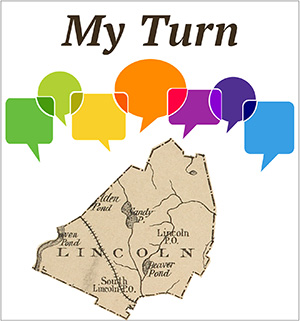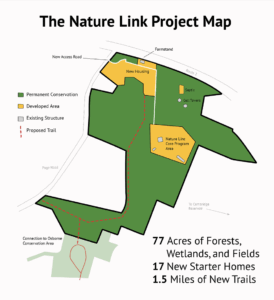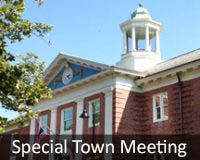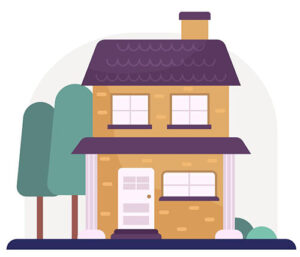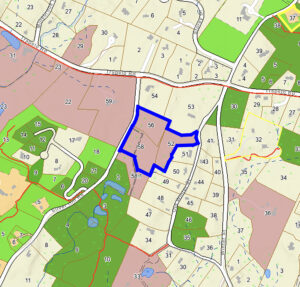By Joseph Kolchinsky
Hello neighbors. I live on Page Road and abut the Farrington land. Like some of you, I was skeptical of the Nature Link proposal at first. But after spending real time with the details, I now believe this is exactly the kind of thoughtful, balanced solution we need in Lincoln. It protects land, supports an important non-profit, adds needed housing, and most importantly it heads off far riskier alternatives. Below I’ve laid out the top concerns I’ve heard and why I believe this deal is the right move for our town. Happy to have thoughtful discourse and welcome open-minds to the conversation. As you read on, I ask that you think of a phrase often used in the nonprofit world: Things happen to you, for you, or because of you.
As a community, if we want to move our missions forward and take advantage of this opportunity, we need to take proactive steps to pounce on this opportunity and make it happen because of us. No one is going to step in and do this work for us. And, if left to chance, alternative outcomes are likely to, happen to us, and they likely won’t be nearly as good as what I believe the Nature Link project achieves.
Top Reasons to Support the Nature Link Project
- Conservation at scale — 77 acres of ecologically valuable land will be permanently protected from future development, preserving forests, wetlands, and trail systems for generations. This is the largest undeveloped, forested, and unprotected area in Lincoln.
- Avoids Dover Amendment risk — By putting Farrington into conservation and giving Farrington financial stability, we substantially reduce the looming risk of institutional-scale development on that land under the Dover Amendment.
- Adds starter homes — 20 modest homes (replacing 3 existing, 17 net) provide much-needed “missing middle” housing stock, helping young families and downsizing seniors stay in Lincoln.
- Supports 40B compliance — Some units will be income-restricted, helping the town meet its Chapter 40B obligations.
- Secures Farrington’s future — This deal stabilizes a non-profit with a mission to connect under-resourced youth with nature, allowing them to continue their work and stay in Lincoln.
- New trails will be made permanently available to all Lincoln residents through the conservation land carved out by this deal.
- What’s good enough for Cambridge is good for us — While “no septic system” is better than any septic system, the City of Cambridge has the most to lose here given they depend on the clean watershed to protect the reservoir as their water source – and they fully support this plan and are putting $800k in to back it up. If the people drinking the water support this to mitigate future risk, I think we should be aware of that future risk and support mitigating it, too.
- Nominal traffic impact — Estimated traffic increase is ~5-10%, a nominal amount that doesn’t warrant the concern. See further below for my analysis on the numbers.
- Transparent, enforceable plan — This is a tightly structured, multi-party agreement with baked-in protections, approvals, and community oversight – not an open-ended blank check to a developer. Farrington’s land is put into conservation through deeds and Conservation Restrictions (CRs), the developer is locked into approved plans, and Farrington’s use of the access road to Page Rd expires upon any transfer of ownership so it can’t be used in the future by other parties.
As a direct neighbor to this project, I don’t take change lightly. I will see and feel the impacts of 17 new homes more than most. It would be easy for me to oppose any development next door. But I choose to support Nature Link because I firmly believe it’s the best path forward for our community as a whole. It’s a rare instance where the community as a whole gets something positive: Farrington gets the funds to sustain its nature programs, Lincoln gets permanently protected land and walking trails, a thoughtful developer gets to build much-needed starter homes, and new families get a chance to make Lincoln their home. I’m willing to support the greater good and, based on recent discussions, believe most of my Page Rd neighbors do as well.
No plan is perfect, and it’s okay to have questions and doubts. I’ve tried to address the major concerns with facts and respectful reasoning further below. Our town’s discourse can certainly get heated — but at the end of the day, I think we all share the same love for Lincoln and want to see it thrive without losing what makes it special. Nature Link is a compromise that achieves that, by blending conservation and smart growth in a way that enhances our community.
I invite everyone to look at the official documents, ask hard questions, and satisfy themselves on the details. From what I’ve seen, the more you dig, the more this deal holds up as sensible and forward-looking. I’ll be voting Yes at the Special Town Meeting on June 25, and I encourage my fellow residents to consider doing the same. Let’s seize this opportunity to protect a beautiful piece of Lincoln while also shaping a future we can be proud of – one where our children and new neighbors can enjoy the same natural beauty and community spirit that drew us all here in the first place.
For a comprehensive Q&A on this topic, please see this document. I will continue to keep it updated as I learn more. Thank you for reading, and I’m happy to discuss further with an open mind and mutual respect.
Joseph and Jennifer Kolchinsky live at 83 Page Rd.
“My Turn” is a forum for readers to offer their letters to the editor or views on any subject of interest to other Lincolnites. Submissions must be signed with the writer’s name and street address and sent via email to lincolnsquirrelnews@gmail.com. Items will be edited for punctuation, spelling, style, etc., and will be published at the discretion of the editor. Submissions containing personal attacks, errors of fact, or other inappropriate material will not be published.
